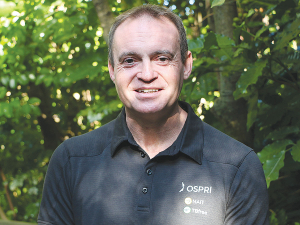Taranaki farmer fined $15,000 for illegal NAIT tag swapping
A Taranaki farmer and livestock agent who illegally swapped NAIT tags from cows infected with a bovine disease in an attempt to sell the cows has been fined $15,000.
 Kevin Forward says poor NAIT record keeping can lead to delays in the response and increased spread of the disease.
Kevin Forward says poor NAIT record keeping can lead to delays in the response and increased spread of the disease.
OSPRI New Zealand says - following the resurgence of M. bovis in Mid Canterbury in late 2022, and concerns raised over poor NAIT record keeping and non-compliance - it is increasing its level of education and support to farmers in the region.
OSPRI's head of traceability, Kevin Forward says the organisation is committed to supporting farmers to understand their NAIT obligations and the importance of adopting good on-farm traceability practices as part of their overall biosecurity preparedness.
"The ability to manage a disease outbreak, contain it, and work towards its eradication relies on accurate traceabilit records," he explains. "Simply put, we all have a role to play when talking traceability and biosecurity, everyone must do their part for the system to work and for the industry to be protected."
He points out that poor NAIT record keeping can lead to delays in the response, increased spread of the disease and increased cost to farmers and the country.
Forward says OSPRI had launched a targeted support campaign to farmers in the Wakanui area.
It aims to help farmers get their NAIT accounts sorted and OSPRI is launching a NAIT education campaign in the greater Ashburton district.
OSPRI's local regional partner, Fiona Caldwell will be running a series of NAIT workshops, drop-in centres, and webinars for farmers to help them understand their NAIT obligations and why traceability is important.
In addition to this, OSPRI and the Ministry for Primary Industries (MPI) will be piloting an early intervention programme for those farmers in the region who are identified as not meeting their NAIT obligations.
The purpos of the early intervention programme is to reach out to farmers to offer support and education, so they understand what their NAIT obligations are, as a person in charge of animals, and know where to get help.
"We're trying to support farmers so they can avoid getting to the point where they're receiving infringements or being prosecuted for non-compliance with NAIT," Forward says.
"Now is not the time to be getting complacent, we need to be thinking not only about the diseases that we are trying to eradicate currently, but also about what could potentially hit us next. We've spent over five years working to eradicate M. bovis from New Zealand, that's a lot of hard work that the industry and individual farmers have all put in. The same applies for bovine TB, except over a longer period."
For more information: https://www.ospri.co.nz/news/lets-protect-our-industry-mid-canterbury/
Voting has started for the renewal of DairyNZ's milksolids levy.
The most successful catchment groups in NZ are those that have 'a source to sea' approach.
Associate Agriculture Minister and Manawatu dairy farmer Andrew Hoggard says the free trade agreement (FTA) negotiated with India is not a bad deal and his party, Act, will support it when it goes before Parliament.
Newly released data from Environment Canterbury (ECan) Farm Environment Plan (FEP) audits are showing a dramatic lift in environmental performance across the region.
A solid recovery of global dairy prices this year makes a $9.50/kgMS milk price almost a shoo-in for this season.
As New Zealand marks the United Nations’ International Year of the Woman Farmer 2026 (IYWF 2026), industry leaders are challenging the misconception that women only support farming.

OPINION: Here w go: the election date is set for November 7 and the politicians are out of the gate…
OPINION: ECan data was released a few days ago showing Canterbury farmers have made “giant strides on environmental performance”.